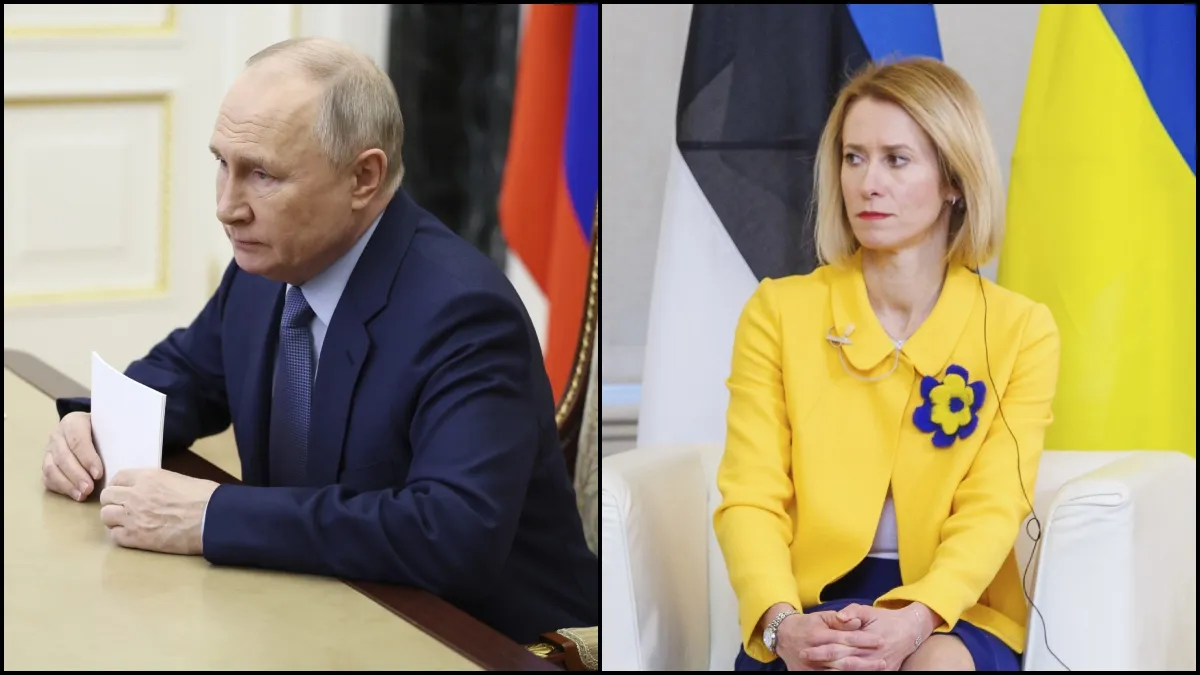Moscow: In a dramatic spike in tensions between Russia and the West, the police in Moscow have put Estonian Prime Minister Kaja Kallas, Lithuania's culture minister and members of the previous Latvian parliament on a wanted list for destroying Soviet-era World War II monuments. Kremlin spokesman Dmitry Peskov said Kallas was wanted for "desecration of historical memory" alongside other Baltic officials.
The destruction of monuments commemorating Soviet soldiers is punishable by a five-year prison term under the Russian criminal code. The Baltic countries of Estonia, Latvia and Lithuania demolished most of their Soviet-era monuments following Russia's invasion of Ukraine almost two years ago. In response, the head of the Russian Investigative Committee, Alexander Bastrykin, ordered a criminal investigation into the matter.
"This is only the beginning. Crimes against the memory of the world's liberators from Nazism and fascism must be prosecuted," said Russian Foreign Ministry spokeswoman Maria Zakharova. The Baltic politicians risk being placed under arrest only if they cross the Russian border, otherwise declaring them as "wanted" is unlikely to have any practical consequence.
Apart from Kallas, Estonian State Secretary Taimar Peterkop, Lithuanian Culture Minister Simonas Kairys and about 60 of the 100 members of the previous Latvian parliament, which ended its term in November 2022, were put on the list, according to the ministry database. Kairys told Reuters the arrest order "means I acted actively and in a principled way".
Increasing tensions between Russia and Western countries
Since Russia’s full-scale invasion of Ukraine nearly two years ago, numerous monuments to Red Army soldiers also have been taken down in Poland and the Czech Republic, a 'purge' of what many see as symbols of past oppression. Moscow has denounced those moves as a desecration of the memory of Soviet soldiers who fell while fighting Nazi Germany.
The inclusion of Kallas — who has fiercely advocated for increased military assistance to Ukraine and stronger sanctions against Russia — appears to reflect the Kremlin’s effort to raise the stakes in the face of North Atlantic Treaty Organisation (NATO) pressure over the war. This is the first time that Moscow has named a foreign leader on its wanted list.
The inclusion of Kallas could also mark an attempt by Moscow to counter last year’s arrest warrant against Russian President Vladimir Putin issued by the International Criminal Court over the alleged deportation of Ukrainian children to Russia. The Interior Ministry’s list also includes ICC President Piotr Hofmanski.
Estonia's Foreign Intelligence Service on Tuesday said Russia is preparing for a military confrontation with the West within the next decade and could be deterred by a counter build-up of armed forces. The chief of the intelligence service said the assessment was based on Russian plans to double the number of forces stationed along its border with NATO members Finland and the Baltic States of Estonia, Lithuania and Latvia.
Will Russia attack the West?
"Russia has chosen a path which is a long-term confrontation ... and the Kremlin is probably anticipating a possible conflict with NATO within the next decade or so," Kaupo Rosin, chief of the intelligence service, told reporters at the release of Estonia's national security threats report. However, a military attack by Russia is "highly unlikely" in the short term, he said, partly because Russia has to keep troops in Ukraine, and would remain unlikely if the Russian buildup of forces was matched in Europe.
"If we are not prepared, the likelihood (of a military Russian attack) would be much higher than without any preparation," Rosin added. Estonia and the other Baltic States have increased their military spending to over 2 per cent of the value of their economies after Russia annexed Crimea in 2014, and NATO allies have raised their presence in those countries.
Putin has said that ridding Ukraine of far-right, neo-Nazi groups is one of the central aims of the war, but he has offered no proof to back his repeated claims that such groups have a decisive voice in shaping Ukraine’s policies. This also comes as NATO members are worried about how the upcoming US presidential election will affect the alliance, after former President Donald Trump said he would even encourage Russia to expand its aggression in Europe.
Russia also warned the West on Tuesday that Moscow would be very tough if the United States and European Union seized hundreds of billions of dollars worth of Russian assets. This was in reference to the US and its allies prohibiting transactions with Russia's central bank and finance ministry after the Ukraine invasion, blocking around $300 billion of sovereign Russian assets in the West.
(with inputs from agencies)
ALSO READ | Ukraine replaces top army general in critical point of war against Russia | Five things about him

